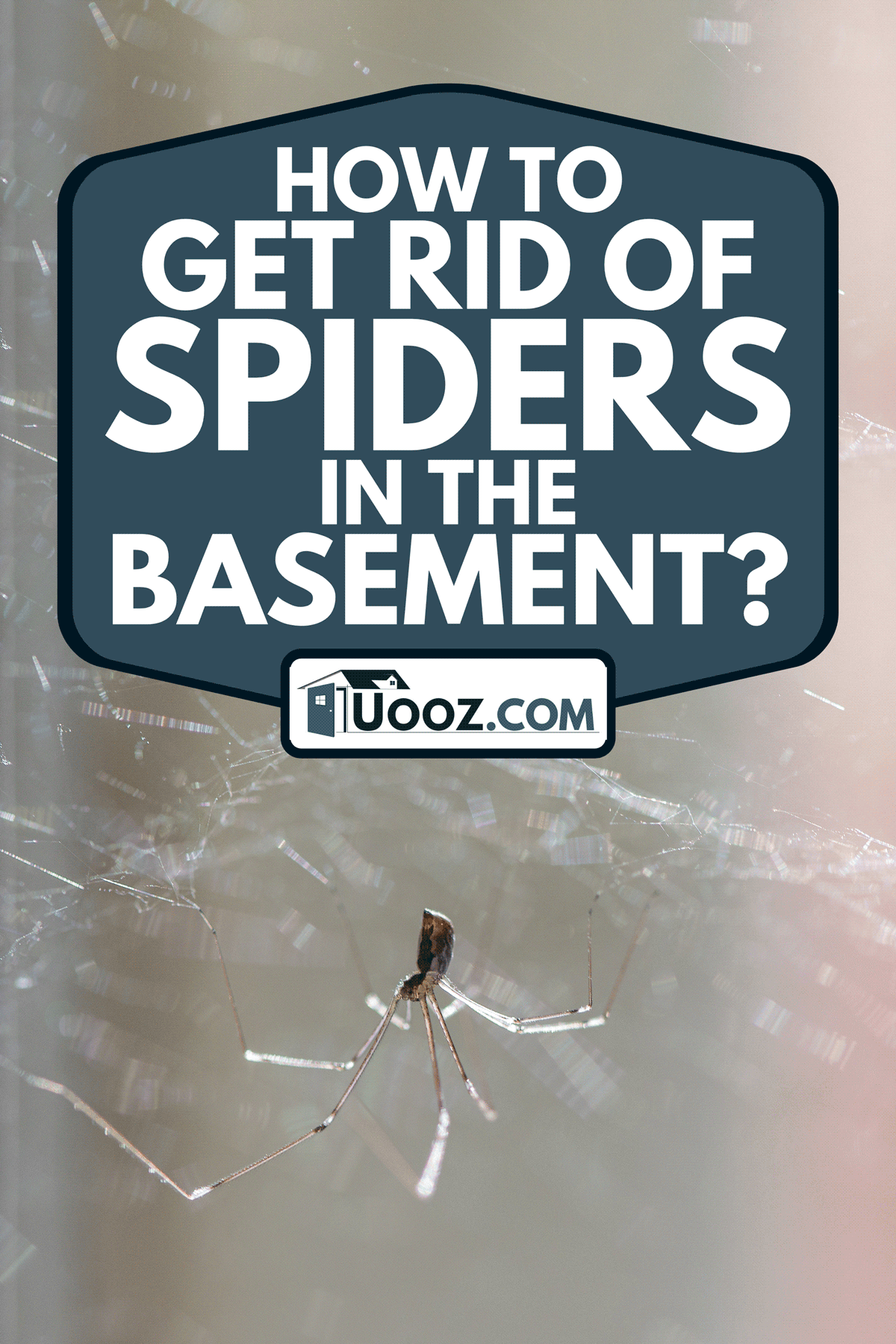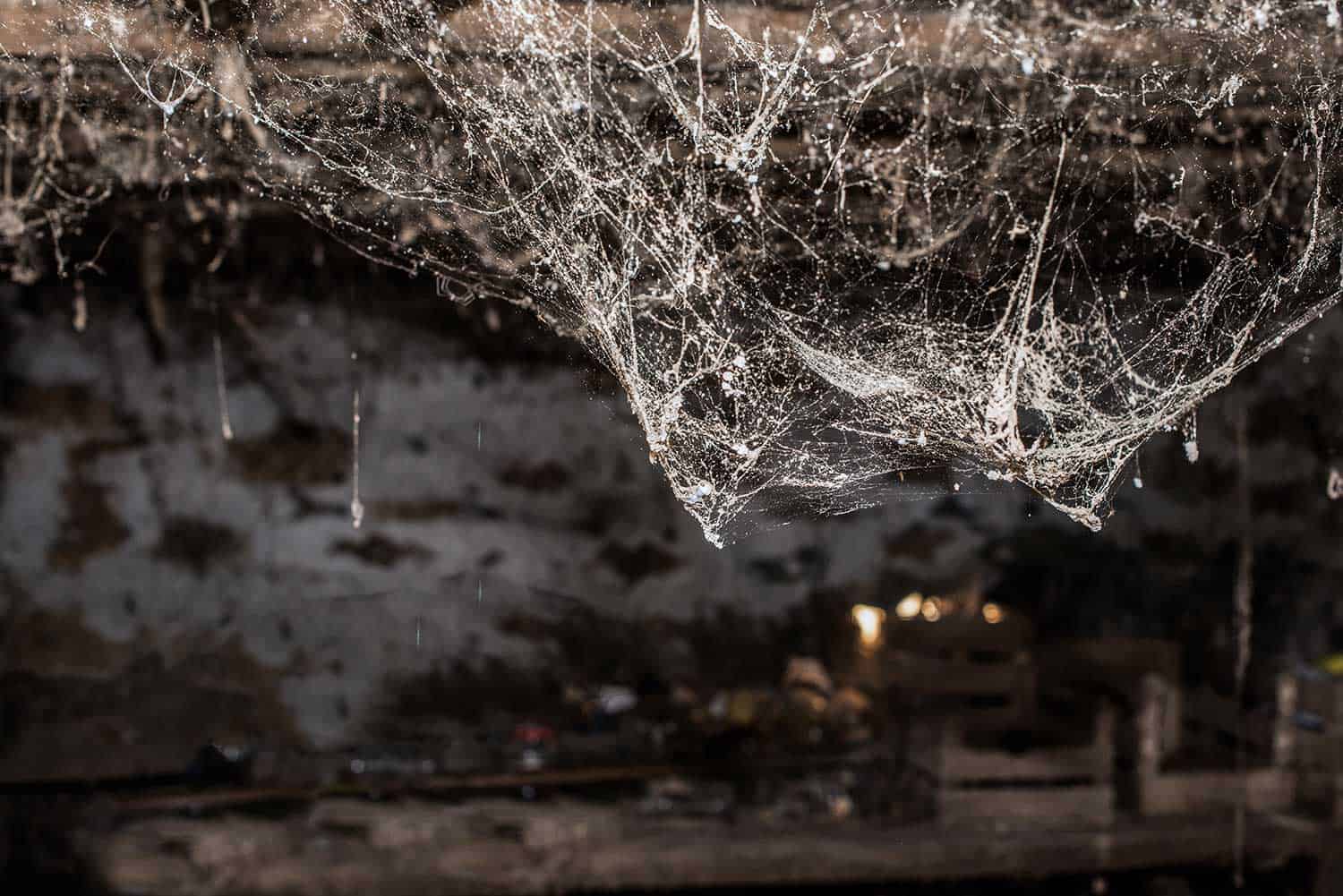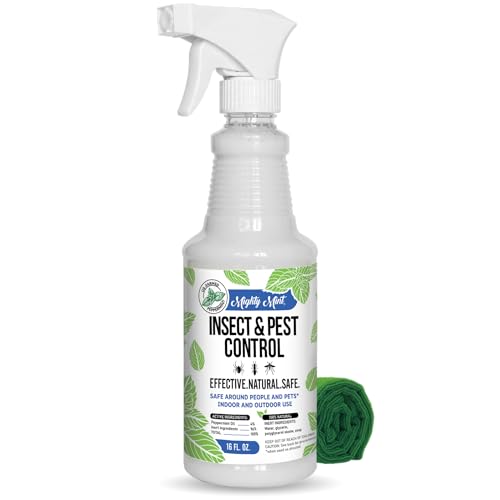While most spiders are considered beneficial to our environment, no one wants to stumble across one in the dark, damp recesses of the basement. Basements have enough creep-factor going on without these little buggers hanging around, so how do you get rid of them? We've done the research and compiled a list to help you solve your spider problem.
Rid your basement of spiders by trying any of these methods:
- Call a professional exterminator
- Vacuum
- White vinegar spray
- Pesticides
- Make spiders uncomfortable
- Ultrasonic or electromagnetic devices
- Spider repellent chemicals
- Natural spider repelling essential oils
- Diatomaceous earth
The best way to get rid of the problem once and for all is to use some of these methods together. Some of these methods use harsh chemicals, and others are more natural but should still be used with caution. Keep reading to learn more about each method and how to use them together.

Methods For How To Get Rid Of Spiders In Basement
1. Call A Professional Exterminator
A professional exterminator is a good start if you don't want to do the hands-on work. An agent of the company will come to your home and make an assessment. They will know where to look, what to look for, and how to identify an infestation. Exterminators will also be able to tell you what kind of spiders you have lurking around and whether or not they are dangerous.
The exterminator will kill any spiders you currently have in your home; they should tell you exactly what chemicals they will use to kill the spiders and how to prevent them from coming back. Exterminators often recommend regular treatment and return visits because their treatments are temporary.
2. Vacuum The Spiders

If you are dealing with a large number of spiders, or you don't want to get close enough for catch-and-release, the vacuum will be a big help. For spiders and webs on the walls and ceilings, use the hose attachments. If there are spiders on the floor, you can use the floor cleaning setting. Make sure to suck up any webs or cobwebs as well.
Vacuums do not always kill spiders, so as soon as you finish, you will want to be ready to properly dispose of the refuse. Do not dispose of the vacuum bag or canister in your home trash can; try to get far away from your home and your neighbor's before disposing of the debris. If you don't want the risk of dealing with living spiders, try one of the spider-killing methods below before sucking up the remains.
3. White Vinegar Spray
Vinegar is a mild acid that can be used for many purposes around the house. It's mild enough that it is safe for humans and pets, but it will harm or kill most spiders. Mix one part water with one part distilled white vinegar and put it in a spray bottle. If you want extra stopping power, you can use more vinegar or strictly vinegar without any water if you can stand the smell. You can also use vinegar to repel spiders, making it a great option for interior use since there are no nasty chemicals to worry about. Reapply it as needed.
4. Pesticides
There are pesticides on the market that kill spiders as well as other bugs, but most of them are made from a mixture of potent chemicals that are not safe to use around people and pets. You can buy these as sprays, aerosols, foggers, and more. These strong chemicals will work great to kill the spiders, but they don't do much to repel future trespassers. If you decide to use a chemical spray, use extreme caution when you apply it, and make sure children and pets are at a safe distance.
Terro Spider Killer Spray
This spray claims to kill spiders on contact, and it has great reviews. Click here to see it on Amazon.
5. Make Spiders Uncomfortable
The best way to prevent future issues with spiders is to make your home inconvenient for them. Remove any boxes or clutter they can hide in. Block their way into the basement and house by filling in any cracks or gaps; even if they don't lead outside, it's somewhere for the spiders to hide. Caulk around any windows, doors, pipes, and other openings. Clear out all the webs and cobwebs.
While you are doing this, take note of any other bugs you find. These bugs are the food source that the spiders are being attracted to, so properly eradicating other bugs will, in turn, help prevent future spider problems. Also, search for any leaking pipes or damp areas of the basement and fix these issues. Spiders require a water source as well, and many species like damp conditions.
6. Ultrasonic or Electromagnetic Devices
These devices plug into the wall and emit a frequency that spiders and other pests run from. Simply plug them in, and they start making a sound that humans can't hear, but pests do. They must be left on to continue working, and you need to purchase enough to cover the size of the room. It is still recommended to properly eliminate the spiders already in your basement before using one of these, or they may just move from the basement to the living area.
Neatmaster Ultrasonic Pest Repeller
This ultrasonic repeller covers 80 to 120 square meters and works on spiders, mice, and a variety of other bugs. Click here to check it out on Amazon.
7. Spider Repellent Chemicals
Spider repellents should be used after the living spiders have been properly dealt with to prevent more spiders from coming into the home. These chemical sprays are dangerous to humans and pets and should be used with care. Spider repellent chemical sprays will need to be re-applied regularly according to the spray's instructions to remain effective.
These should be used around doors and windows, cracks and gaps, and anywhere else spiders may try to enter the home or hide. Other more natural options can accomplish the same effect, so chemical repellents may be better suited for outdoor applications, like around the windows on the exterior of your home.
8. Natural Spider Repellents
If you wonder, "how to get rid of spiders in the basement naturally," we've got you covered. There are many natural ways to keep spiders out that are safer for the interior of your home. You will still want to use caution and research before you try a new natural repellent. For instance, peppermint essential oil is a great natural way to repel spiders but can be toxic to cats and dogs, so it should be avoided if you own pets.
All of the following are natural spider repellents that can be used to keep spiders out of the home. You can try planting these around your home to help keep spiders away or use their essential oils to make a spray. You can even buy pre-made natural spider repellent sprays made from essential oils. Be sure to research whether or not these plants are toxic to pets before planting or spraying them around your home.
- Peppermint
- Citrus (i.e. Lemon, Orange)
- Eucalyptus
- Tea Tree
- Lavender
- Citronella
- Cinnamon
- Cedar
Mighty Mint Pest Control Peppermint Spray
This natural spider repellent is made from peppermint essential oils. It is toxic to cats but effectively repels spiders. Click here to see this on Amazon.
9. Diatomaceous Earth
Diatomaceous earth is made from ground-up diatom fossils. Diatoms are incredibly small aquatic organisms with skeletons made of silica; this silica is all that is left after fossilization and is found and mined from the sediment around bodies of water. When ground up finely, the silica is very sharp to small organisms like spiders and other bugs. The silica cuts the bugs all over their bodies, then soaks up the creatures' fats and oils, causing a slow death.
Diatomaceous earth is harmless to humans and pets on contact, but it should never be inhaled, as the sharp silica particles can damage lung tissue. Wear a mask when using diatomaceous earth, especially if you plan to use a duster.
Harris Diatomaceous Earth Insect Killer
This bag of diatomaceous earth should be able to treat your entire basement multiple times; it even comes with a duster. Click here to see it on Amazon.
How Are Spiders Getting Into My Basement?
Spiders will squeeze into the tiniest of cracks and crevices to get into your home. Windows and doorways are easy targets for them. Make sure all your windows have screens and repair or replace any torn screens. Fill any cracks and gaps on the walls and around doors and windows. If you bring items in from outside, make sure you check the items over for spiders before you enter the house.
What Is The Best Spider Repellent?
This really depends on what you feel comfortable using in your home. Many people refuse to use chemicals in their homes for fear of illness in children or pets, so natural solutions may be a better fit for them. Other people may not enjoy the smell of peppermint or other strong essential oils and opt for chemicals instead. Find what you feel comfortable with and test some stuff out to find the right fit. The best way to repel spiders is to make your home inhabitable to them and to block off any places they can squeeze in.
Good Riddance!
Now that you know all these different methods to rid your basement of spiders, you can weigh the differences and choose the technique that will be best for your family. Once you decide what to try, you will be ready to wage war with these common pests and come out on top. Good luck! Let us know which method worked best for you in the comments.
If you are also fighting off spiders in your attic, you may enjoy our article Can You Fog Your Attic For Bugs? [Here's How].
If you have moisture issues in your basement that need to be addressed to keep spiders away, read our article How To Fix A Leaky Basement Wall From The Inside.




